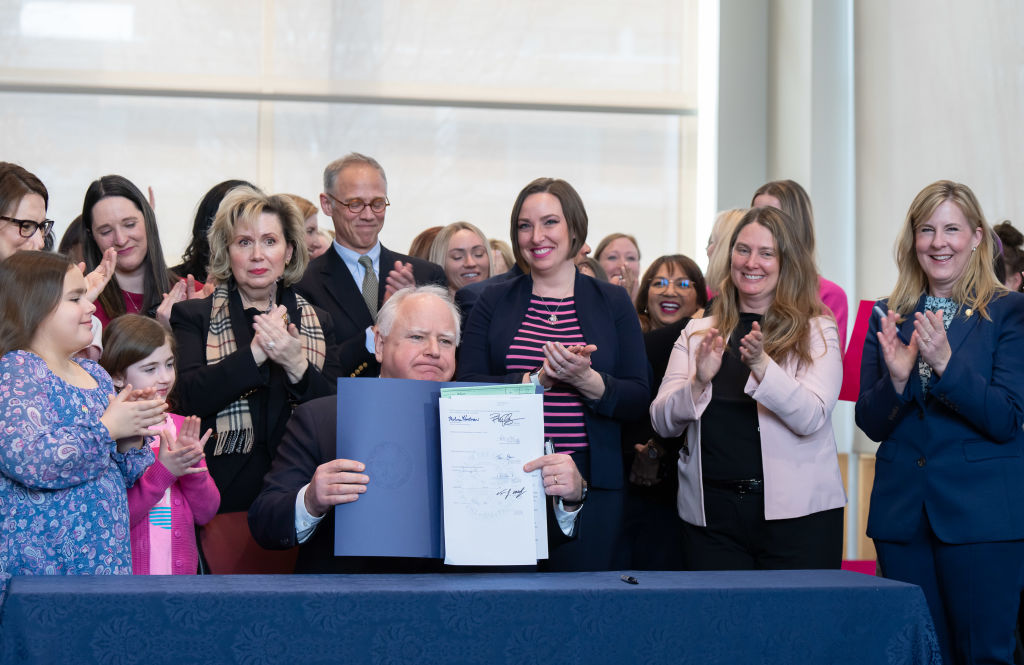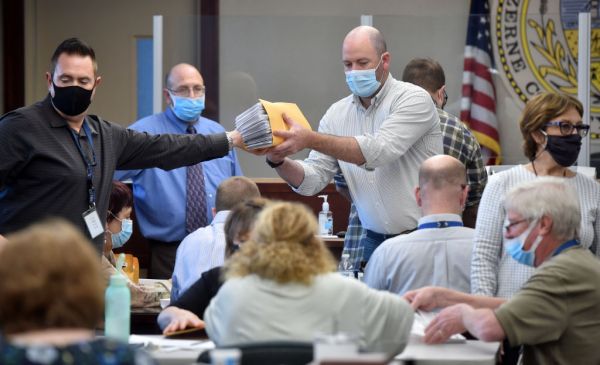Minnesota Gov. Tim Walz’s progressive policy achievements in Minnesota have faced scrutiny since Vice President Kamala Harris chose him as her running mate. Some social conservatives in particular have claimed his positions on law-and-order, gender identity, and abortion are far outside the national mainstream.
Last week, right-wing commentator Charlie Kirk claimed in an X post with more than 1 million views (and which he shared on Instagram) that, during Walz’s governorship, eight infants were “born alive during botched abortions,” in Minnesota. “None of them received any care attempting to save their lives, and most of them didn’t receive basic comfort care either,” Kirk added.
In his post, Kirk cites an August 6 article by John Solomon for Just the News. Solomon’s piece explains that the Minnesota Department of Health—which at the time was required to report all cases of living fetuses delivered during an abortion procedure—recorded eight such incidents between January 1, 2019, and December 31, 2022. Solomon also claims that “Walz worked with his new Democrat-controlled Legislature to eliminate both the reporting requirement and the state’s legal obligation for doctors, nurses and medical professionals to administer life-saving care to infants born alive during an abortion procedure.”
Kirk and Solomon’s claims are correct. Minnesota Department of Health documents show that eight infants were born alive during abortion procedures between 2019 and 2022, and, in 2023, Walz signed legislation that repealed most of a statute designed to protect infants born alive after an abortion attempt.
Born-alive infants in Minnesota.
Minnesota state law explicitly protected children born alive during abortion procedures since at least 1976 when the state legislature adopted Section 145.423. This statute determined that, “A live child born as a result of an abortion shall be fully recognized as a human person, and accorded immediate protection under the law.” It also read, “All reasonable measures consistent with good medical practice, including the compilation of appropriate medical records, shall be taken to preserve the life and health of the child.”
In 2015, the Minnesota state legislature passed additional legislation, signed into law by Democratic Gov. Mark Dayton, intended to expand the state’s protections for born-alive infants. The Born Alive Infants Protection Act made minor terminology changes to the existing three subsections of Section 145.423, and added an additional six subsections including those covering civil penalties for medical personnel who did not provide adequate care, privacy protections for court proceedings related to born-alive infants, and the status of born alive-infants who survive following an abortion procedure. The act also formally defined “born-alive infants” as “every infant member of the species Homo sapiens who is born alive at any stage of development.”
As part of the act, Minnesota’s 1998 abortion reporting guidelines were also modified to require additional details—including what medical actions were taken to aid the infant, whether the infant survived, and the status of the surviving infant—in all instances of born-alive infants.
In the first three and a half years of this additional reporting—prior to Walz taking office—the state recorded 16 abortion procedures that led to live births: five in the second half of 2015 after the legislation went into effect; five in 2016; three in 2017; and three in 2018.
In 2019, the first year of Walz’s governorship, Minnesota recorded three cases of born-alive infants, one of whom was pre-viable, another who had fetal anomalies, and a third who was given comfort care measures. None of the three survived.
No instances occurred in 2020, but in 2021 there were five. Of these cases, two were pre-viable, two were given comfort care, and one had fetal anomalies. None of the five survived. No additional instances occurred in 2022.
Legislation repealed.
On May 22, 2023, the Minnesota state legislature passed an omnibus bill—signed into law the next day by Walz—that repealed all six subdivisions added by the 2015 Born Alive Infants Protection Act as well as two of the three subdivisions established in the original 1976 statute. The bill left intact the first subdivision—which read “All reasonable measures consistent with good medical practice, including the compilation of appropriate medical records, shall be taken to preserve the life and health of the child”—but changed its language requiring medical personnel to “preserve the life and health of the born alive infant” to instead require medical personnel to “care for the infant who is born alive.” The bill also repealed many of Minnesota’s abortion reporting requirements, including information about born-alive infants.
Earlier in 2023, Walz signed legislation enshrining the right to abortion into Minnesota law following the Supreme Court’s reversal of Roe v. Wade. The new statute established that “Every individual who becomes pregnant has a fundamental right to … obtain an abortion,” and did not include any restrictions or prohibitions. Minnesota currently has no statutory limits on abortion at any stage of pregnancy.
If you have a claim you would like to see us fact check, please send us an email at factcheck@thedispatch.com. If you would like to suggest a correction to this piece or any other Dispatch article, please email corrections@thedispatch.com.











Please note that we at The Dispatch hold ourselves, our work, and our commenters to a higher standard than other places on the internet. We welcome comments that foster genuine debate or discussion—including comments critical of us or our work—but responses that include ad hominem attacks on fellow Dispatch members or are intended to stoke fear and anger may be moderated.
With your membership, you only have the ability to comment on The Morning Dispatch articles. Consider upgrading to join the conversation everywhere.